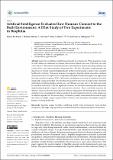Artificial Intelligence Evaluates How Humans Connect to the Built Environment: A Pilot Study of Two Experiments in Biophilia
Author(s)
Ramm, Tobias M.; Werwie, Mathias; Otto, Tim; Gloor, Peter A.; Salingaros, Nikos A.
Downloadsustainability-16-00868-v2.pdf (6.413Mb)
Publisher with Creative Commons License
Publisher with Creative Commons License
Creative Commons Attribution
Terms of use
Metadata
Show full item recordAbstract
Many factors influence well-being and health in everyday life. While people are aware of traffic delays or continuous work stress, other factors influence the state of the body on a subconscious level. The built environment subconsciously influences human physiology during every second of life, which has a cumulative long-term effect. The idea of biophilic design identifies the importance of natural elements implemented in architectural structures to improve the occupants’ health and well-being. This paper measures the impact of biophilic design on positive emotions and productivity in two separate but conceptually related pilot studies that apply novel approaches: (a) facial emotion recognition (FER) with residual masking networks and (b) sentiment detection using Large Language Models. The first study measures the emotions of people when confronted with images of different kinds of architecture, via FER and via a user survey. We find clear trends for emotions detected by FER and significant evidence for self-stated emotions that architecture implementing biophilic design evokes more positive emotions. The second study measures the influence of natural elements on productivity and team engagement. The findings show that natural elements in the surroundings do influence productivity and sentiment positively. As the sample size of subjects, especially for the second study, was relatively small, future research will need to apply these ideas in a larger setup to acquire further evidence for the importance of biophilic design for human well-being and health.
Date issued
2024-01-19Department
Massachusetts Institute of Technology. Center for Collective IntelligencePublisher
Multidisciplinary Digital Publishing Institute
Citation
Sustainability 16 (2): 868 (2024)
Version: Final published version